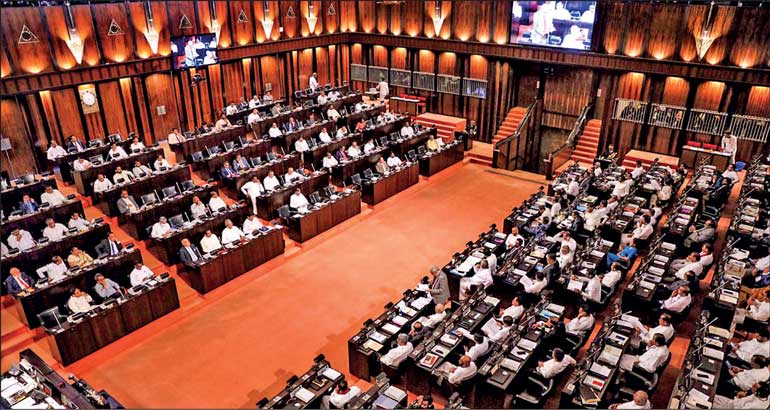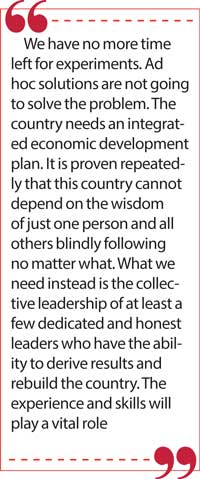Thursday Feb 19, 2026
Thursday Feb 19, 2026
Wednesday, 22 November 2023 00:12 - - {{hitsCtrl.values.hits}}


What the country needs at the darkest hour is a clear agenda agreed by the majority and a committed leadership to implement those plans
 This year’s Budget is presented at a time when the people of the country are struggling, unable to bear the economic hardships. Given the serious economic crisis the country is facing, one would have expected the Government to present a practical budget addressing the core economic issues. However, the 2024 Budget appears to be another fairy tale budget that does not seek real solutions to the problems facing the country.
This year’s Budget is presented at a time when the people of the country are struggling, unable to bear the economic hardships. Given the serious economic crisis the country is facing, one would have expected the Government to present a practical budget addressing the core economic issues. However, the 2024 Budget appears to be another fairy tale budget that does not seek real solutions to the problems facing the country.
The country grapples with two pivotal challenges—a persistent economic contraction and an escalating national debt. The ongoing contraction poses a significant hurdle to growth, while the increasing burden of debt compounds the complexity of economic challenges.
Therefore, one would have expected answers to these problems from the Budget, basically:
1. How can the Government reactivate the economy and push for growth?
2. How can the Government bail us out of the debt trap?
The 2024 Budget does not provide creative answers to these two main issues. In fact, the implementation of budget proposals will only aggravate these conditions.
Meanwhile, the Government is once again presenting unrealistic revenue targets as they did last year.
The estimated revenue of 2023 as per the previous Budget was Rs. 3,415 billion. But the latest estimates say only Rs. 2,851 billion will be received by the end of 2023, which is an income 17% lower than the original estimate.
If you analyse the latest Budget, the Government is estimating an income of 4,127 billion for 2024, which is a 45% increase over 2023. How realistic is that target when the economy continues to shrink?
Last year the economic contraction was 7.8%, and this year during the first six months, the contraction is 7.9%. These are performances below IMF expectations. For next year, even the IMF had predicted very low growth, and the reality could be worse at this rate.
Under this situation, can any reasonable person expect the 45% increase in revenue targets for next year to be achieved?
Therefore, the revenue target of Rs. 3,415 billion in 2024 seems to be another unrealistic wish.
Even if the revenue targets are not met, there seems to be no reduction in Government expenditure.
The estimated expenditure of next year is Rs. 6,978 billion, which is an increase of 34% compared to the latest estimates of 2023.
In order to achieve the desired revenue, the Government has to keep increasing taxes and fees, as they have done during the last 1½ years.
The most recent addition to these ever-increasing taxes is the increase of VAT from 15% to 18%. Not only is it increasing the rates, new VAT will be applied to a large number of goods that have not been charged VAT before, such as fuel, electricity, telephone charges, etc. People will realise these hidden attacks only when they see their bills.
It is a commonly accepted principle that when there are too many taxes imposed on an economy, it negatively affects the economy.
As the taxes go up, entrepreneurs are discouraged, investments are decreasing, people tend to cheat on taxes, and intellectuals are leaving the country. There are many such negative consequences.
The end result is that the Government does not get the expected revenue. That is why the Government’s income in 2023 is 17% lower than expected. The same is likely to happen next year. What’s the point of having high income only on estimates when the reality is different?
As we all know, a budget gap occurs when government annual revenue is less than expenditure.
The expected budget gap of 2024 is Rs. 2,851 billion. This gap has to be bridged by further borrowings or printing of money.
One can argue that there is no problem in borrowing if the borrowed money is invested in future income-generating development activities. But if we keep borrowing to facilitate consumption, then it is unacceptable. In Sri Lanka, that is what is happening.
Government expenditure in 2024
 Let us look at the breakdown of Government expenditure in 2024 as per the Budget. Recurring expenditure is Rs. 5,345 billion, whereas the capital expenditure is only Rs. 1,209 billion. In other words, recurrent expenditure will increase by 11%, while capital expenditure will decrease by 1% in 2024.
Let us look at the breakdown of Government expenditure in 2024 as per the Budget. Recurring expenditure is Rs. 5,345 billion, whereas the capital expenditure is only Rs. 1,209 billion. In other words, recurrent expenditure will increase by 11%, while capital expenditure will decrease by 1% in 2024.
Despite Government’s promises to establish more universities and promote human capital development, the budgeted expenditure on education will not be increased. Expenditure on women and social empowerment will be reduced by half.
The tax interest of Rs. 2,634 billion to be paid next year will be almost half of the total recurring expenses. That shows the gravity of the situation. We are in this crisis due to excessive borrowings, and we continue to rely on borrowings even to manage our day-to-day affairs.
We must not forget that the current President came to power thanks to a debt crisis. But during his first 1½ years, the country’s debt has only increased with no signs of settling the existing debts. Today our debt-to-GDP ratio exceeds 100% despite his promises to reverse the pattern. The 2024 Budget proposes to borrow nearly Rs. 3 trillion, which will add to the debt burden.
When the President presented the Budget last time, some members of the opposition also praised the Budget. “Now the Government is on the right track,” they said. But not everyone was fooled. I remember saying in the Parliament that “A leopard cannot change its spots.” In other words, a person who has implemented failed policies in the past is not going to perform any new magic now because his values and beliefs are not going to change.
President Ranil Wickremesinghe always has grand ideas. But historically, he has not been a great implementer. By the end of 2023, once again, we saw this pattern emerging. As highlighted by many parliamentarians during the Budget debate, almost 90% of the 2023 Budget proposals show no progress.
Presenting the last Budget, the President talked about the 3 main pillars of the economic process of recovering the country:
1. An export-oriented competitive economy
2. An environmentally friendly green and blue economy
3. A digital economy
That sounded very logical. One couldn’t have agreed more. But as we predicted, the country has not made much progress in any of these areas after one year. Instead of building on these plans, the latest Budget is talking about different things such as a gig economy. So overall that shows a lack of consistency, which has been the biggest problem in our country.
The people of this country no longer trust the economic management of the Government nor the budgets. Today their biggest concern is how to put food on the table and feed their families, how to support the education of their children and take care of their health needs. They do not know how to pay their ever-increasing fuel, electricity, and water bills. Basically, they don’t know how to make ends meet.
But then we can’t just lose hope. Someone has to come up with a solution.
The problem of successive other Governments has been their failure to have consistency in their policies and, most importantly, the failure to implement them.
The current Government has a bigger problem. That is the lack of coordination between ministries. The left hand doesn’t know what the right hand is doing. Let us look at a few simple examples.
On one side, the Government is talking about the need to attract local and foreign investment. On the other hand, the Government keeps increasing the cost of fuel, water, and electricity. These are vital costs of production. Sri Lanka’s electricity tariff is now one of the highest in the world. So how are we going to attract investments into the country?
It appears from various statements by ministers that the Government agrees with the proposition that the small and medium sector is the backbone of the economy. On the other hand, the Government doesn’t think twice about importing any consumer item whenever the ministers get into a battle with the local producers. Take the simple example of what arbitrary eggs imports have done to the local poultry industry.
Leadership of the country do not see eye to eye
 Just look at the crisis of cricket in the country. Isn’t it quite clear that the minister of sports and the leadership of the country do not see eye to eye on most of the issues that are being discussed in the public domain?
Just look at the crisis of cricket in the country. Isn’t it quite clear that the minister of sports and the leadership of the country do not see eye to eye on most of the issues that are being discussed in the public domain?
What the country needs at the darkest hour is a clear agenda agreed by the majority and a committed leadership to implement those plans.
We have no more time left for experiments. Ad hoc solutions are not going to solve the problem. The country needs an integrated economic development plan.
It is proven repeatedly that this country cannot depend on the wisdom of just one person and all others blindly following no matter what. What we need instead is the collective leadership of at least a few dedicated and honest leaders who have the ability to derive results and rebuild the country. The experience and skills will play a vital role.
We should identify priorities and set clear goals if we are to come out of this crisis. Otherwise, we will only be talking.
Consider the absence of specific targets in crucial areas. For instance, there is a lack of a defined timeframe for the comprehensive digitisation of the tax collection process. Similarly, the absence of annual targets for increasing tourism, fostering export development, expanding the use of renewable energy, reducing electricity costs, and establishing clear targets for attracting Foreign Direct Investment (FDI) raises concerns about the strategic planning and goal-setting within these essential sectors.
But someone must be held responsible. The problem with our country is that no one is accountable.
Identifying and maintaining priorities has been a persistent challenge, as outlined in numerous Budget presentations where crucial objectives were emphasised. However, a recurring issue arises with the subsequent Budget cycles, where these priorities are often forgotten or neglected.
A comprehensive solution to tackle the ongoing crisis entails a targeted strategy, including:
Reactivating the Economy: Prioritising initiatives aimed at stimulating economic activity and fostering growth.
Strengthening the Export Economy: Emphasising measures to enhance and fortify the country’s export sector.
Creating Rapid Growth in Tourism: Implementing strategies to facilitate the swift expansion of the tourism industry.
Expanding the Market for Foreign Workers: Exploring opportunities to broaden the scope for foreign labour markets.
Building up Small and Medium Businesses: Providing support and nurturing the growth of small and medium-sized enterprises.
Attracting New Investments on a Large Scale: Implementing measures to draw substantial investments into the economy.
A vibrant and active economy, facilitated through these targeted priorities, would alleviate the need for excessive tax hikes, especially when accompanied by efficient tax collection. By ensuring proper revenue collection and exploring avenues to ease existing tax burdens, the government can contribute to a healthier economic environment. This comprehensive strategy aims to not only address immediate concerns but also establish a foundation for sustained economic well-being.
This Budget, devoid of strategies to reactivate the economy, strengthen the export sector, spur tourism, expand opportunities for foreign workers, nurture small and medium businesses, and attract significant investments, will worsen the existing economic challenges. Consequently, it will contribute to a further slowdown in the country’s economy, intensifying economic pressure on the populace and exacerbating the issue of brain drain.
In conclusion, the proposed Budget for 2024, if implemented, not only fails to address the critical issues facing the country but may exacerbate economic challenges.
(The writer is a Member of Parliament.)